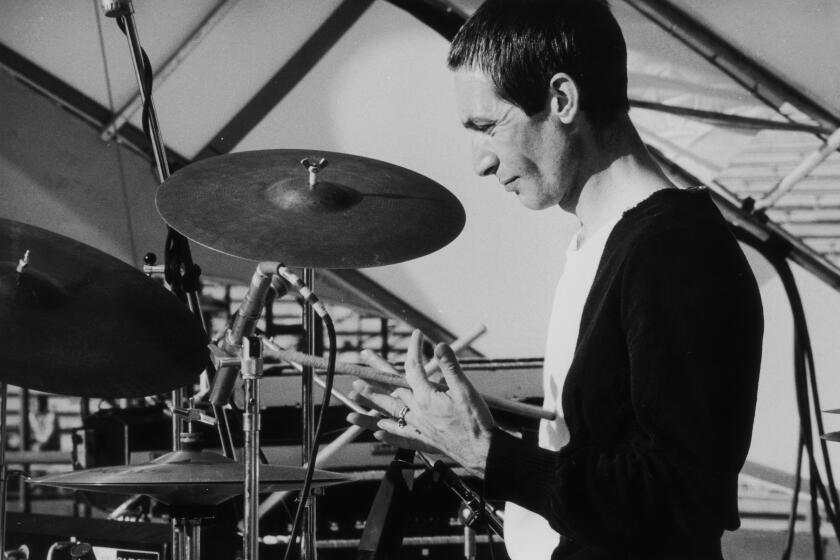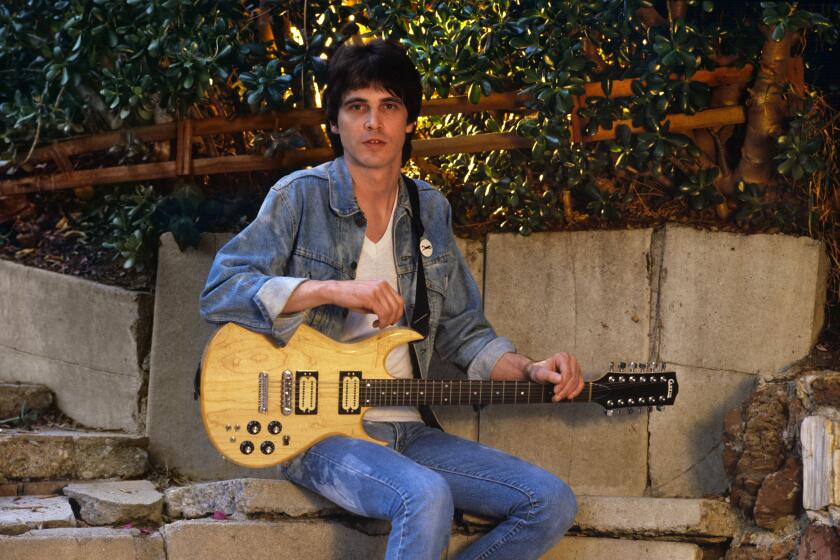Review: Oldies but goodies, the Rolling Stones gather no moss on ‘Hackney Diamonds’

Seven songs into the vigorous new Rolling Stones album, and there it is: the instantly identifiable thwack of Charlie Watts’ snare drum.
A slinky yet propulsive disco-rock jam, “Mess It Up” is one of two tracks on “Hackney Diamonds,” the Stones’ first set of original material in 18 years, for which Watts laid down his drum parts before he died at age 80 in 2021; the other one, “Live by the Sword,” arrives directly after “Mess It Up” and complements Watts’ signature wallop with Elton John on barrel-house piano and an appearance by the Stones’ retired bassist, Bill Wyman.
“It’s too late to say you’re sorry,” Mick Jagger sings in the latter against the swarming guitars of Keith Richards and Ronnie Wood. “And soon it will be gone.”
The tunes with Watts serve as a kind of historical anchor on a 12-track LP that otherwise seeks a path forward with help from Steve Jordan, the longtime Stones associate who plays drums on the rest of “Hackney Diamonds,” and producer Andrew Watt, a pop hitmaker known for his work with Justin Bieber, Miley Cyrus and Post Malone. It wants to matter today without betraying yesterday.
The Rolling Stones drummer, who joined the group in 1963 and never missed a gig, died Tuesday at age 80.
You’re allowed to wonder, of course, whether the Stones were right to proceed without Watts, whose steadfast drumming didn’t just drive the band’s music for decades but provided some of its most indelible hooks as well: Think of the bawdy funk groove in “Honky Tonk Women” or the strutting hi-hats in “Miss You”; try to imagine someone else finding their way into a song like Watts did on “Start Me Up.”
But moving on is simply what the Stones do, as they established in the ’60s and ’70s after the departures of Brian Jones and Mick Taylor and as they reminded everyone two years ago when they hit the road mere weeks after Watts’ death. Fresh blood in the studio is an old habit too: Remember the Dust Brothers’ involvement, a year after Beck’s “Odelay,” in “Bridges to Babylon”?

Jagger, now the band’s senior member at age 80, has said that the Stones recruited Watt because they needed an outside figure to “crack the whip” — a role the producer has fulfilled on recent albums by fellow veterans such as Ozzy Osbourne and Iggy Pop. And indeed Watt’s presence here seems less about modernizing than about streamlining; there are no obvious synth sounds or tinny trap beats, though Jagger does seem to be singing about Instagram in “Mess It Up,” where he accuses someone of having “shared my photos with all your friends.” (Maybe that viral shot at the Thirsty Beaver wasn’t his idea.)
The songs blend the same ingredients the Stones have been using since the beginning — blues, rock, soul, country, gospel — but they’re tighter and punchier than on any of the band’s previous late-era LPs. Catchier too: “Hackney Diamonds” — the title refers to broken car windows in a once-rough East London neighborhood — opens rat-a-tat with three cuts Watt co-wrote with Jagger and Richards, each with a sticky melody you can almost imagine catching hold on TikTok. “Angry” and “Get Close” are fuzzed-out rockers built around dive-bombing guitar riffs; “Depending on You” is a country-ish lope with a disarmingly tender vocal from Jagger, who spends most of the album sneering rather than swooning.
Dwight Twilley was best known for 1975’s ‘I’m on Fire,’ a perfect rock ‘n’ roll song that became his band’s enduring hit.
“Bite My Head Off,” with more sharp-angled licks from Richards and Wood — and a punky bass line played by Paul McCartney — has the frontman happily yowling about “f—ing with your brain,” while “Live by the Sword” offers up a series of dubious wise-guy aphorisms: “If you look like a whore, better be hardcore / If you live by the clock, well, you’re in for a shock.” Jagger’s singing is strong throughout “Hackney Diamonds,” not least in “Driving Me Too Hard,” another gaslighting lover’s complaint after “Angry” and “Bite My Head Off” in which he reaches notes you might have thought were beyond him.
Wisely, though, Watt seems most interested in showcasing the Stones’ glorious guitars, which keep threatening to overflow the tidy structures of these songs. Flinty, unpredictable, endlessly splintering: Even after half a century, nobody has come close to replicating the weave of sound Richards and Wood can still get in a song like the surging “Whole Wide World” or “Driving Me Too Hard,” which echoes the cascading effect of “Tumbling Dice.” As the group’s timekeeper, Jordan maintains a steady if recognizably human pulse beneath it all.
“Hackney Diamonds” closes, intriguingly, with two songs that roll back the album’s high-polish approach. First is “Sweet Sounds of Heaven,” a shaggy, slow-building R&B epic with shrieking guest vocals from Lady Gaga and churchy keys by Stevie Wonder. Second is a seriously stripped-down rendition of the Muddy Waters tune that inspired the band’s name: “Rolling Stone Blues,” presented here with just Jagger singing and playing harmonica and Richards scratching at his guitar like it was a mosquito bite.
For a band as long-lived as this one, it’s probably foolish to hear the song as a denouement. But then you can’t defy an expectation without setting one first.










